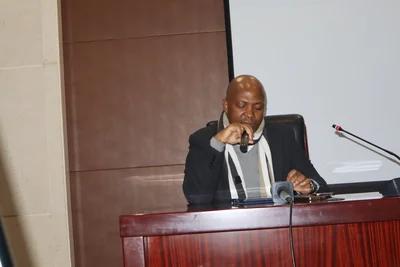Africa-Press – Lesotho. The Ministry of Tourism, Sports, Arts and Culture recently held a media training workshop aimed at equipping members of the Lesotho media with a deeper understanding of the tourism sector and the ministry’s key functions.
The workshop, which brought together journalists from various radio stations, newspapers, and online platforms, was designed to build a collaborative relationship between the media and the ministry.
Its primary goal was to ensure accurate, responsible, and impactful reporting on tourism issues, programmes and opportunities that can help boost the country’s image locally and internationally.
Speaking at the event, Minister of Tourism, Sports, Arts, and Culture, Hon. Motlatsi Maqelepo, emphasised that the media plays a crucial role in shaping public perception and influencing tourists’ behaviour.
The workshop was therefore meant to build a mutually beneficial network with the media, he said.
“Tourism is everyone’s business. We need the media to help us tell Lesotho’s story about the beautiful landscapes, the culture, the history, and the opportunities. But to do that effectively, the media must understand what we do and why it matters. Henceforth, we have called on the media to introduce every department in the tourism sector and what they do,” he said.
Maqelepo outlined that their office’s mandate is to make Lesotho a tourism destination, through arts, conservation and management of cultural heritage, and to develop sports.
Officials from various departments under the ministry, including heritage, tourism development, hospitality regulation, and environmental conservation presented detailed overviews of their mandates, challenges, and areas where media support is needed.
“We aim to empower journalism and news reporting at all levels, to aid in professional and effective reporting,” said Maqelepo.
Participants were also taken through interactive sessions on how to spot tourism angles in news, how to humanise stories to attract tourists, and how to use digital platforms to promote local destinations effectively.
Mantiti Khabo, Principal Secretary Tourism noted that the workshop marked the beginning of a long-term partnership with the media.
“We do not want this to be a once-off event. Our aim is to engage the media continuously, provide access to information, and even involve them in tourism product development and promotion strategies.”
She added that tourism has the potential to significantly contribute to Lesotho’s economy through job creation, small business growth, and foreign investment, but this can only be realised with joint efforts from all sectors, including the media.
Many journalists expressed appreciation for the training, citing that it gave them new insights and an appreciation for the potential of tourism in Lesotho.
“Well, the workshop was a great initiative for both the ministry and the media. It opened important dialogue and highlighted how much room there is for improvement on both ends. Often, misinformation stems from a lack of knowledge, and as media, access to accurate, timely information is critical to building a reliable and informed public,” said Tšepiso Serabele, a journalist from Weekly Observer Newspaper.
On the Ministry’s side, Serabele said, there is still work to be done, particularly around sustainability models and governance, adding that we all share one goal, to make Lesotho a destination of choice.
“Tourism is one of the key pillars for the national strategy development plan, for its sustainable development and economic growth of our one and only country. Both the government and the media have vital roles to play.”
She further noted that achieving both stakeholders’ shared goal requires them to move forward together, each doing their part. The government must create an enabling environment through effective policies, while the media ensures that these efforts and stories are amplified, recognised, and reach the people they’re meant to serve.
Serabele concluded by noting that collaboration, mutual understanding, and shared strategy are key. “After all, our roles are meant to complement one another, not compete. This workshop was indeed a step in the right direction.”
For More News And Analysis About Lesotho Follow Africa-Press






